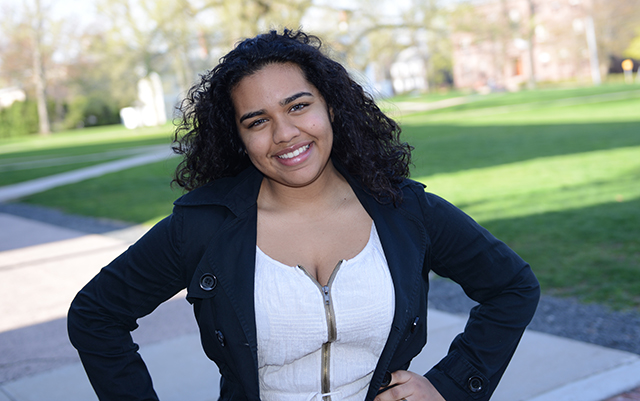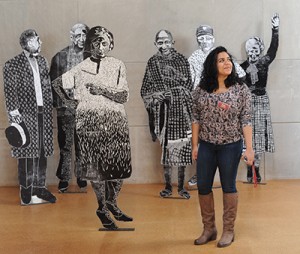Garcia ’15 is Pre-Med, a WesEMT, Tutor, Latin Dancer

Q: Zaida, where are you from and what attracted you to Wesleyan?
A: I’m from Flushing, New York. Initially, I was attracted to Wesleyan because many students from the program I attend, Prep for Prep, have gone to or currently attend Wes. Since many students I respect went there, I figured that there must be something about this school that keeps bringing us here. I realized through my visits and talks with students that I love Wesleyan’s openness and diversity. Of course, no institution is perfect when it comes to embracing so many views, but Wesleyan offers far more than many other places. Everyone I met was so interesting!
Q: What are you majoring in and why is it important to you to have a liberal arts education?
A: I’m a double major in African-American studies and feminist, gender and sexuality studies. I’m also pre-med! My fields of study aren’t traditionally thought of as routes to the medical world, but I believe the humanities are necessary towards any career path. I find the sciences fascinating and vital, but in medical school they will surround me constantly, and I do not want to ever loose sight of the fact that the job requires that I interact with people. We need to understand why certain populations have unequal access to quality treatment, or why someone may be afraid to report their injuries of domestic violence. Otherwise, a doctor can’t serve anyone fully. Wesleyan’s liberal arts education allows me the flexibility to explore these while still fulfilling my pre-med requirements. I am especially glad to be surrounded by Wesleyan’s amazing visual arts.
Q: Who are some of your favorite professors, and classes at Wes?
A: Last semester, I took Service-Learning at Connecticut Valley Hospital with Professor Jim Donady. The concrete end-goal of the course was to interview our psychiatric patients using the CASIG (Client’s Assessment of Strengths, Interests, and Goals). But it was the intangible that I will never forget from this class: the affirmation of humanity. We are all people, yet some discard those with mental illness as “crazy”, as “other”, literally denying someone’s personhood. You might not think someone else, or even your own self, is interesting or deserving of respect. But you can make a movie out of anyone’s life, it is that important. You can make a life out of your life if you wanted to, you and everyone else is that important. Professor Donady’s stories and quirky ways have affirmed that. Additionally, Leah Wright’s Introduction to Modern African American History is the reason why I am an African-American Studies Major and Leticia Alvarado’s Latina Feminisms is why I’m pursuing FGSS. These amazing women have also taught me to dissect and trace back the chain reactions that create a person.
Q: What do you hope to do after Wesleyan?
A: After Wesleyan, I hope to become a gynecologist for underserved communities. I’ve always wanted to become a doctor; the human body is an amazing machine and I want to understand every single way that it functions. My EMT class and hospital internships have solidified for me this interest, especially when I could watch a dilation and curettage without fainting and even with fascination! I’ve decided that I want to pursue gynecology because in the past couple of years, feminism has come to the forefront of my values. Through personal experience, I’ve realized concretely the subtle ways in which women are subjected (in addition to more overt forms), and the magnified consequences of this subtle subjection. This affects numerous areas in a person’s life, including access to quality healthcare, and I want to be there to help fill in this gap. I hope to help tackle the cycle of internalized and externalized second-class citizenship. My goal after Wesleyan is to always treat people with respect.

Q: What extra curricular activities and student organizations are you involved in?
A: I am on the board for Ajùa Campos (the Latin@ student organization) as its advertiser. We had Cherrie Moraga speak as our keynote speaker this past November, and she was amazing! I also teach about health sexual attitudes and education to high school students through ASHA (Adolescent Sexual Health Awareness). I am in WesEMT, where we train to become Nationally Registered EMTs. It can be gross at times and slightly terrifying to know that you can be the difference that decides whether someone lives or not. But this class has solidified for me that I want to practice medicine. I am a tutor at Cross Street tutorial, event staff through the office of Student Activities and Leadership Development, and a gallery monitor at Zilkha Gallery in the Center for the Arts. Unofficially, I help out a couple of other student groups by making flyers for them. Next year, Sonia Zavala ’15 and I will be co-chairs of Caliente, the Latin@ dance group. We are going to choreograph over the summer, so look out for some dope performances and workshops!
Q: What is your favorite thing about being a Wesleyan student?
A: Wesleyan gives us students a great range of freedom to create what we want. This kind of influence allows us to mold Wesleyan as much as we can to reflect our values. Students organized an incredibly impactful and revealing forum on diversity in which students were able to talk to administrators, including Public Safety and President Roth. Terpsichore is student run, Resident Advisors create programs for their halls, and students hold jobs in almost every department and building on campus. There are so many possibilities. We just have to be the ones to be creative and initiate them.

